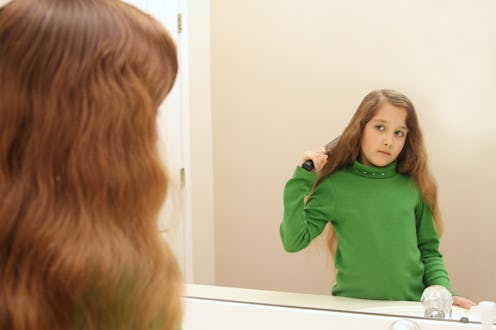Style
Am I Pretty Or Ugly?

In my early 20s, a site called "Hot or Not" was all the rage. It was pretty simple: People could upload a photo and be rated either hot or not by the site's users. At the time, it seemed kind of like the height of awfulness. But a trend among today's teen girls has me longing for the Hot or Not days.
Since 2011 or so, teens have been turning to YouTube to ask "Am I pretty or ugly?", and the trend has been getting additional media attention in recent weeks. A search for the phrase on YouTube yields more than 600,000 results. You guys can watch a few of these below, but I warn you: They're pretty heartbreaking. "I'm making this video because I want to know if I'm pretty or not," says a teen named Faye hesitantly, after admitting that her friends say she's pretty but others at school have called her ugly a lot. "People at my school say I'm the ugliest person ... that could be living," states another teen.
Whether the teens in these videos are conventionally pretty or not is obviously beside the point. Regardless, they're opening themselves up to the judgement of Internet assholes. Many are going to find that kids at school have nothing on the kind of insults and unkind judgements that commenters can anonymously hurl. British performance artist Louise Orwin recently demonstrated this for a piece called Pretty Ugly, currently showing at a feminist theater festival in England. Orwin adopted three 15-year-old girl personas and made her own "POU" videos. “I got torrents of abuse,” Orwin told Wired UK. “People were telling me to fuck off and die." She also got a lot of requests from older men wanting to see more.
But Maureen O'Connor at The Cut offers a different interpretation. "What if teens are actually making these clips as a way to try on the trappings of celebrity?" she asks.
In a sense, the girls making "Pretty or Ugly?" videos are “playing house” with fame — by opening themselves up to critique, they're simulating a miniature version of stardom. All prominent people have haters, after all. ... Having haters becomes a status symbol — albeit one that comes with potentially insidious emotional baggage.
The videos may not be so much about confidence-boosting as attention-seeking, O'Connor suggests. "And it just so happens opening yourself up to physical scrutiny is a disproportionately effective attention-seeking method for teen girls."
That might be — yet it's hard to watch many of these and see anything other than young girls brimming with desperate insecurity and seeking validation. Sadly, most aren't going to hear what they want to — this is the Internet after all. To put it in web parlance: The Internet is great for easing insecurities said no one ever. The abuse can be hard enough for adult women to deal with; I can't imagine how disorienting it must be for girls barely (if even) past puberty.